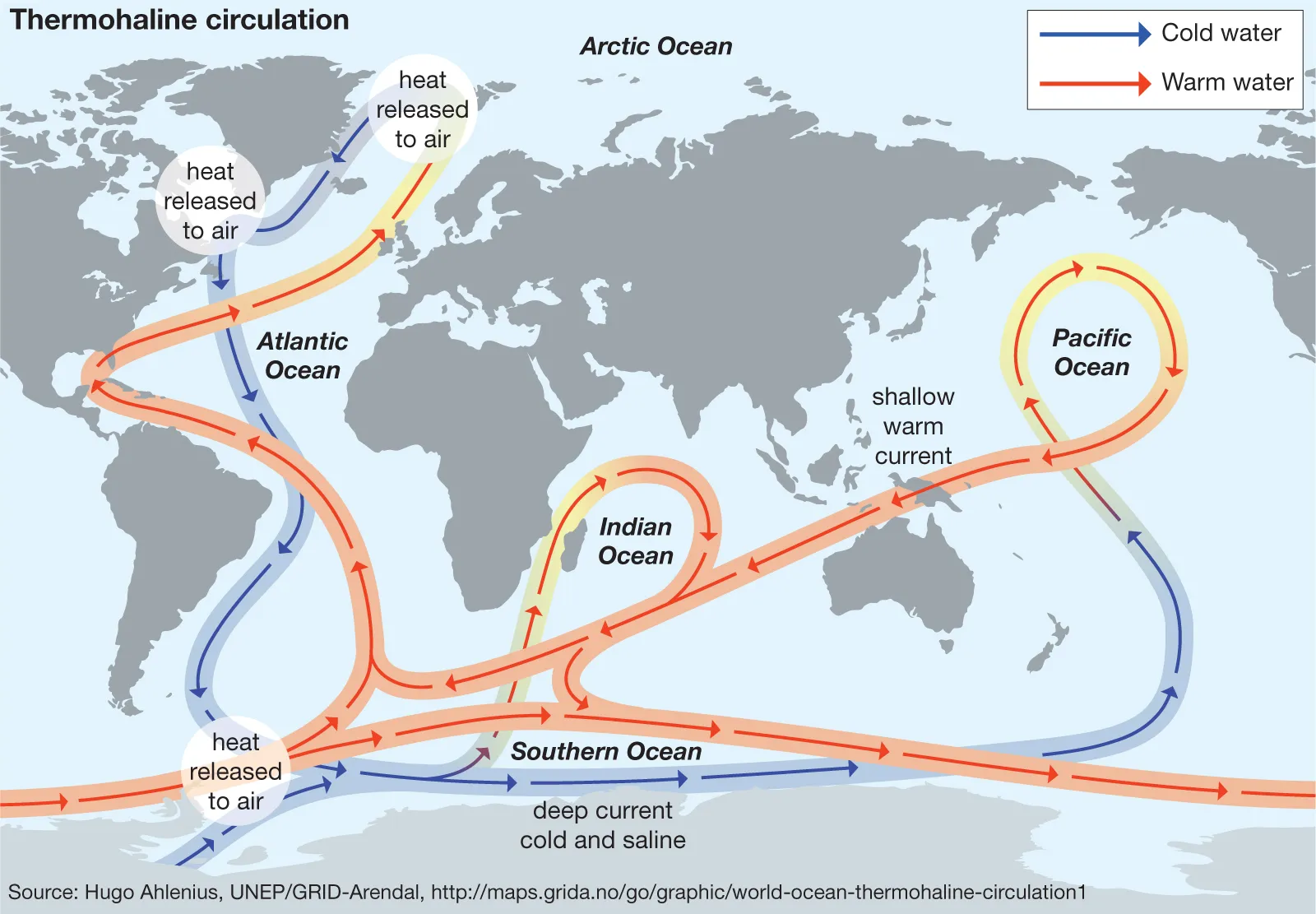Ahmedabad
(Head Office)Address : 506, 3rd EYE THREE (III), Opp. Induben Khakhrawala, Girish Cold Drink Cross Road, CG Road, Navrangpura, Ahmedabad, 380009.
Mobile : 8469231587 / 9586028957
Telephone : 079-40098991
E-mail: dics.upsc@gmail.com

Deep-Water Circulations
News: New studies have shown that the global overturning circulation controls ocean heat distribution and atmospheric carbon dioxide levels, thus playing a critical role in global climate.
Key Findings:
• Studies suggest that changes in ocean routes caused by tectonics, like the closing of the Central American Seaway, had a big effect on ocean circulation. Central American Seaway is a body of water that once separated North America from South America,
• These changes may have led to the creation of two distinct water bodies - Northern component water in the North Atlantic Ocean and Antarctic Bottom Water (AABW) in the Southern Ocean.
• Consequently, it is also hypothesized that there would have been large-scale changes in the Deep-Water Circulation (DWC) in the oceans across the world, impacting global climate and heat exchanges.
What is Deep Water Circulation?
• It refers to the movement of water in the deep ocean. It is driven by the density differences between water masses caused by variations in temperature and salinity.
• In the Earth's polar regions ocean water gets very cold, forming sea ice. As a consequence, the surrounding seawater gets saltier, because when sea ice forms, the salt is left behind.
• As the seawater gets saltier, its density increases, and it starts to sink. Surface water is pulled in to replace the sinking water, which in turn eventually becomes cold and salty enough to sink. This creates a circulation pattern that is known as the thermohaline circulation.
Significance:
• It helps to distribute heat around the globe, which helps to regulate the Earth's temperature and keep different regions from becoming too hot or too cold.
• It is responsible for shaping the ocean's currents and the circulation patterns of the world's oceans. These currents in turn influence the marine ecosystem, weather patterns, and coastal regions.
• It plays a critical role in controlling atmospheric carbon dioxide levels by helping to transport carbon from the surface to the deep ocean, where it can be stored for long periods of time.
• It also has an impact on sea level, as warm water is less dense than cold water, therefore it can also affect sea level by redistributing heat and thermal expansion.
Deep Water circulations and Indian Ocean:
• The Indian Ocean does not produce its own deep water, it only receives it from other sources such as the North Atlantic and Antarctic.
• The northern part of the Indian Ocean is located far away from the areas where deep water is formed and ocean routes, making it a good place to study the impact of ocean circulation changes.
• Studies have been done in the Indian Ocean to understand past Deepwater circulation using records from iron-manganese crusts and authigenic neodymium isotope composition of sediment cores.
• These records have few limitations:
o Iron-manganese crusts are found at deeper depths and are only bathed by Antarctic Bottom Water (AABW), so they can only provide information about the history of AABW.
o Authigenic neodymium isotope records are only available from the Bay of Bengal region, but they are also not accurate as the Himalayan rivers that flow into the Bay bring in a lot of neodymium particulates which can interfere with the results.
• However, recently Scientists have generated an authigenic neodymium isotope record from the Arabian Sea and reconstructed the DWC record of the Indian Ocean for the period from 11.3 million years ago (Miocene era) to 1.98 million years ago (Pleistocene era).

Address : 506, 3rd EYE THREE (III), Opp. Induben Khakhrawala, Girish Cold Drink Cross Road, CG Road, Navrangpura, Ahmedabad, 380009.
Mobile : 8469231587 / 9586028957
Telephone : 079-40098991
E-mail: dics.upsc@gmail.com
Address: A-306, The Landmark, Urjanagar-1, Opp. Spicy Street, Kudasan – Por Road, Kudasan, Gandhinagar – 382421
Mobile : 9723832444 / 9723932444
E-mail: dics.gnagar@gmail.com
Address: 2nd Floor, 9 Shivali Society, L&T Circle, opp. Ratri Bazar, Karelibaugh, Vadodara, 390018
Mobile : 9725692037 / 9725692054
E-mail: dics.vadodara@gmail.com
Address: 403, Raj Victoria, Opp. Pal Walkway, Near Galaxy Circle, Pal, Surat-394510
Mobile : 8401031583 / 8401031587
E-mail: dics.surat@gmail.com
Address: 303,305 K 158 Complex Above Magson, Sindhubhavan Road Ahmedabad-380059
Mobile : 9974751177 / 8469231587
E-mail: dicssbr@gmail.com
Address: 57/17, 2nd Floor, Old Rajinder Nagar Market, Bada Bazaar Marg, Delhi-60
Mobile : 9104830862 / 9104830865
E-mail: dics.newdelhi@gmail.com